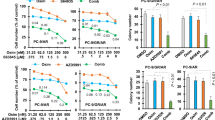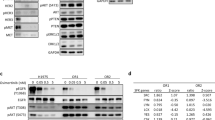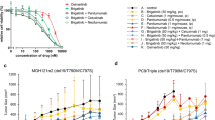Abstract
In addition to the classical resistance mechanisms, receptor tyrosine-protein kinase AXL is a main mechanism of resistance to third-generation epidermal growth factor receptor-tyrosine kinase inhibitor (EGFR-TKI) osimertinib in EGFR-mutated non-small cell lung cancer (NSCLC). Developing an effective AXL inhibitor is important to sensitize osimertinib in clinical application. In this study we assessed the efficacy of brigatinib, a second-generation of anaplastic lymphoma kinase (ALK)-TKI, as a novel AXL inhibitor, in overcoming acquired resistance to osimertinib induced by AXL activation. We established an AXL-overexpression NSCLC cell line and conducted high-throughput screening of a small molecule chemical library containing 510 anti-tumor drugs. We found that brigatinib potently inhibited AXL expression, and that brigatinib (0.5 μM) significantly enhanced the anti-tumor efficacy of osimertinib (1 μM) in AXL-mediated osimertinib-resistant NSCLC cell lines in vitro. We demonstrated that brigatinib had a potential ability to bind AXL kinase protein and further inhibit its downstream pathways in NSCLC cell lines. Furthermore, we revealed that brigatinib might decrease AXL expression through increasing K48-linked ubiquitination of AXL and promoting AXL degradation in HCC827OR cells and PC-9OR cells. In AXL-high expression osimertinib-resistant PC-9OR and HCC827OR cells derived xenograft mouse models, administration of osimertinib (10 mg·kg−1·d−1) alone for 3 weeks had no effect, and administration of brigatinib (25 mg·kg−1·d−1) alone caused a minor inhibition on the tumor growth; whereas combination of osimertinib and brigatinib caused marked tumor shrinkages. We concluded that brigatinib may be a promising clinical strategy for enhancing osimertinib efficacy in AXL-mediated osimertinib-resistant NSCLC patients.
This is a preview of subscription content, access via your institution
Access options
Subscribe to this journal
Receive 12 print issues and online access
$259.00 per year
only $21.58 per issue
Buy this article
- Purchase on Springer Link
- Instant access to full article PDF
Prices may be subject to local taxes which are calculated during checkout






Similar content being viewed by others
References
Soria JC, Ohe Y, Vansteenkiste J, Reungwetwattana T, Chewaskulyong B, Lee KH, et al. Osimertinib in untreated EGFR-mutated advanced non-small-cell lung cancer. N Engl J Med. 2018;378:113–25.
Ramalingam SS, Vansteenkiste J, Planchard D, Cho BC, Gray JE, Ohe Y, et al. Overall survival with osimertinib in untreated, EGFR-mutated advanced NSCLC. N Engl J Med. 2020;382:41–50.
Papadimitrakopoulou VA, Mok TS, Han JY, Ahn MJ, Delmonte A, Ramalingam SS, et al. Osimertinib versus platinum-pemetrexed for patients with EGFR T790M advanced NSCLC and progression on a prior EGFR-tyrosine kinase inhibitor: AURA3 overall survival analysis. Ann Oncol. 2020;31:1536–44.
Lee J, Kim HS, Lee B, Kim HK, Sun JM, Ahn JS, et al. Genomic landscape of acquired resistance to third-generation EGFR tyrosine kinase inhibitors in EGFR T790M-mutant non-small cell lung cancer. Cancer. 2020;126:2704–12.
Minari R, Bordi P, La Monica S, Squadrilli A, Leonetti A, Bottarelli L, et al. Concurrent acquired BRAF V600E mutation and MET amplification as resistance mechanism of first-line osimertinib treatment in a patient with EGFR-mutated NSCLC. J Thorac Oncol. 2018;13:e89–e91.
Le X, Puri S, Negrao MV, Nilsson MB, Robichaux J, Boyle T, et al. Landscape of EGFR-dependent and -independent resistance mechanisms to osimertinib and continuation therapy beyond progression in EGFR-mutant NSCLC. Clin Cancer Res. 2018;24:6195–203.
Sun SY. Taking early preventive interventions to manage the challenging issue of acquired resistance to third-generation EGFR inhibitors. Chin Med J Pulm Crit Care Med. 2023;1:3–10.
Taniguchi H, Yamada T, Wang R, Tanimura K, Adachi Y, Nishiyama A, et al. AXL confers intrinsic resistance to osimertinib and advances the emergence of tolerant cells. Nat Commun. 2019;10:259.
Okura N, Nishioka N, Yamada T, Taniguchi H, Tanimura K, Katayama Y, et al. ONO-7475, a novel AXL inhibitor, suppresses the adaptive resistance to initial EGFR-TKI treatment in EGFR-mutated non-small cell lung cancer. Clin Cancer Res. 2020;26:2244–56.
Kim D, Bach DH, Fan YH, Luu TT, Hong JY, Park HJ, et al. AXL degradation in combination with EGFR-TKI can delay and overcome acquired resistance in human non-small cell lung cancer cells. Cell Death Dis. 2019;10:361.
Liu YN, Tsai MF, Wu SG, Chang TH, Tsai TH, Gow CH, et al. Acquired resistance to EGFR tyrosine kinase inhibitors is mediated by the reactivation of STC2/JUN/AXL signaling in lung cancer. Int J Cancer. 2019;145:1609–24.
Yoshimura A, Yamada T, Serizawa M, Uehara H, Tanimura K, Okuma Y, et al. High levels of AXL expression in untreated EGFR-mutated non-small cell lung cancer negatively impacts the use of osimertinib. Cancer Sci. 2023;114:606–18.
Namba K, Shien K, Takahashi Y, Torigoe H, Sato H, Yoshioka T, et al. Activation of AXL as a preclinical acquired resistance mechanism against osimertinib treatment in EGFR-mutant non-small cell lung cancer cells. Mol Cancer Res. 2019;17:499–507.
Lei T, Xu T, Zhang N, Zou X, Kong Z, Wei C, et al. Anlotinib combined with osimertinib reverses acquired osimertinib resistance in NSCLC by targeting the c-MET/MYC/AXL axis. Pharmacol Res. 2023;188:106668.
Noronha A, Belugali Nataraj N, Lee JS, Zhitomirsky B, Oren Y, Oster S, et al. AXL and error-prone DNA replication confer drug resistance and offer strategies to treat EGFR-mutant lung cancer. Cancer Discov. 2022;12:2666–83.
Taverna JA, Hung CN, DeArmond DT, Chen M, Lin CL, Osmulski PA, et al. Single-cell proteomic profiling identifies combined AXL and JAK1 inhibition as a novel therapeutic strategy for lung cancer. Cancer Res. 2020;80:1551–63.
Bhalla S, Fattah FJ, Ahn C, Williams J, Macchiaroli A, Padro J, et al. Phase 1 trial of bemcentinib (BGB324), a first-in-class, selective AXL inhibitor, with docetaxel in patients with previously treated advanced non-small cell lung cancer. Lung Cancer. 2023;182:107291.
Yang YM, Jang Y, Lee SH, Kang B, Lim SM. AXL/MET dual inhibitor, CB469, has activity in non-small cell lung cancer with acquired resistance to EGFR TKI with AXL or MET activation. Lung Cancer. 2020;146:70–7.
Han R, Hao S, Lu C, Zhang C, Lin C, Li L, et al. Aspirin sensitizes osimertinib-resistant NSCLC cells in vitro and in vivo via Bim-dependent apoptosis induction. Mol Oncol. 2020;14:1152–69.
Zhu C, Wei Y, Wei X. AXL receptor tyrosine kinase as a promising anti-cancer approach: functions, molecular mechanisms and clinical applications. Mol Cancer. 2019;18:153.
Lotsberg ML, Wnuk-Lipinska K, Terry S, Tan TZ, Lu N, Trachsel-Moncho L, et al. AXL targeting abrogates autophagic flux and induces immunogenic cell death in drug-resistant cancer cells. J Thorac Oncol. 2020;15:973–99.
Engelsen AST, Lotsberg ML, Abou Khouzam R, Thiery JP, Lorens JB, Chouaib S, et al. Dissecting the role of AXL in cancer immune escape and resistance to immune checkpoint inhibition. Front Immunol. 2022;13:869676.
Terry S, Dalban C, Rioux-Leclercq N, Adam J, Meylan M, Buart S, et al. Association of AXL and PD-L1 expression with clinical outcomes in patients with advanced renal cell carcinoma treated with PD-1 blockade. Clin Cancer Res. 2021;27:6749–60.
Nyakas M, Fleten KG, Haugen MH, Engedal N, Sveen C, Farstad IN, et al. AXL inhibition improves BRAF-targeted treatment in melanoma. Sci Rep. 2022;12:5076.
Zaman A, Bivona TG. Targeting AXL in NSCLC. Lung Cancer. 2021;12:67–79.
Hoel A, Osman T, Hoel F, Elsaid H, Chen T, Landolt L, et al. Axl-inhibitor bemcentinib alleviates mitochondrial dysfunction in the unilateral ureter obstruction murine model. J Cell Mol Med. 2021;25:7407–17.
Giles KM, Kalinowski FC, Candy PA, Epis MR, Zhang PM, Redfern AD, et al. Axl mediates acquired resistance of head and neck cancer cells to the epidermal growth factor receptor inhibitor erlotinib. Mol Cancer Ther. 2013;12:2541–58.
Holland SJ, Pan A, Franci C, Hu Y, Chang B, Li W, et al. R428, a selective small molecule inhibitor of Axl kinase, blocks tumor spread and prolongs survival in models of metastatic breast cancer. Cancer Res. 2010;70:1544–54.
Woo SM, Min KJ, Seo SU, Kim S, Kubatka P, Park JW, et al. Axl inhibitor R428 enhances TRAIL-mediated apoptosis through downregulation of c-FLIP and survivin expression in renal carcinoma. Int J Mol Sci. 2019;20:3253.
Yeo XH, Sundararajan V, Wu Z, Phua ZJC, Ho YY, Peh KLE, et al. The effect of inhibition of receptor tyrosine kinase AXL on DNA damage response in ovarian cancer. Commun Biol. 2023;6:660.
Xu C, Han Y, Xu S, Wang R, Yue M, Tian Y, et al. Design, synthesis and biological evaluation of new Axl kinase inhibitors containing 1,3,4-oxadiazole acetamide moiety as novel linker. Eur J Med Chem. 2020;186:111867.
Zhang YX, Knyazev PG, Cheburkin YV, Sharma K, Knyazev YP, Orfi L, et al. AXL is a potential target for therapeutic intervention in breast cancer progression. Cancer Res. 2008;68:1905–15.
Park IK, Mundy-Bosse B, Whitman SP, Zhang X, Warner SL, Bearss DJ, et al. Receptor tyrosine kinase Axl is required for resistance of leukemic cells to FLT3-targeted therapy in acute myeloid leukemia. Leukemia. 2015;29:2382–9.
Fedorenko IV, Fang B, Koomen JM, Gibney GT, Smalley KS. Amuvatinib has cytotoxic effects against NRAS-mutant melanoma but not BRAF-mutant melanoma. Melanoma Res. 2014;24:448–53.
Camidge DR, Kim HR, Ahn MJ, Yang JCH, Han JY, Hochmair MJ, et al. Brigatinib versus crizotinib in ALK inhibitor-naive advanced ALK-positive NSCLC: final results of phase 3 ALTA-1L trial. J Thorac Oncol. 2021;16:2091–108.
Camidge DR, Kim HR, Ahn MJ, Yang JC, Han JY, Lee JS, et al. Brigatinib versus crizotinib in ALK-positive non-small-cell lung cancer. N Engl J Med. 2018;379:2027–39.
Bedi S, Khan SA, AbuKhader MM, Alam P, Siddiqui NA, Husain A. A comprehensive review on Brigatinib - A wonder drug for targeted cancer therapy in non-small cell lung cancer. Saudi Pharmacol J. 2018;26:755–63.
Hanley MJ, D’Arcangelo M, Felip E, Garrido P, Zhu J, Ye M, et al. A phase 1 drug-drug interaction study between brigatinib and the CYP3A substrate midazolam in patients with ALK-positive or ROS1-positive solid tumors. J Clin Pharmacol. 2023;63:583–92.
Uchibori K, Inase N, Araki M, Kamada M, Sato S, Okuno Y, et al. Brigatinib combined with anti-EGFR antibody overcomes osimertinib resistance in EGFR-mutated non-small-cell lung cancer. Nat Commun. 2017;8:14768.
Wang Y, Yang N, Zhang Y, Li L, Han R, Zhu M, et al. Effective treatment of lung adenocarcinoma harboring EGFR-activating mutation, T790M, and cis-C797S triple mutations by brigatinib and cetuximab combination therapy. J Thorac Oncol. 2020;15:1369–75.
Jiang XM, Xu YL, Yuan LW, Zhang LL, Huang MY, Ye ZH, et al. TGFbeta2-mediated epithelial-mesenchymal transition and NF-kappaB pathway activation contribute to osimertinib resistance. Acta Pharmacol Sin. 2021;42:451–9.
Hangauer MJ, Viswanathan VS, Ryan MJ, Bole D, Eaton JK, Matov A, et al. Drug-tolerant persister cancer cells are vulnerable to GPX4 inhibition. Nature. 2017;551:247–50.
Wang L, Fu H, Song L, Wu Z, Yu J, Guo Q, et al. Overcoming AZD9291 resistance and metastasis of NSCLC via ferroptosis and multitarget interference by nanocatalytic sensitizer plus AHP-DRI-12. Small. 2023;19:e2204133.
Hanniford D, Ulloa-Morales A, Karz A, Berzoti-Coelho MG, Moubarak RS, Sánchez-Sendra B, et al. Epigenetic silencing of CDR1as drives IGF2BP3-mediated melanoma invasion and metastasis. Cancer Cell. 2020;37:55–70.e15.
Acknowledgements
This work was supported by the National Natural Science Foundation of China [grant numbers 81972189 and 82172623], Chongqing Technology Innovation and Application Development Special Key Project[CSTB2023TIAD-STX0003], Clinical medical technology innovation ability training program [grant numbers 2019CXLCA003], Chongqing Municipal Bureau of Science and Technology[cstc2021jscx-xczxX0015], Clinical Medical Research Talent Training Program of Army Medical University [grant numbers 2018XLC1015], Chongqing Science and Technology Commission [grant numbers cstc2021jcyj-msxmX0014, CSTB2022NSCQ-MSX0941] and Chongqing graduate scientific research innovation project [grant numbers CYB22277].
Author information
Authors and Affiliations
Contributions
RH, CHL and CH, contributed equally to this work; YH conceptualized the idea and designed the study; RH and CHL development of methodology; RH, CHL, CH, CY L, YYD, DW, WLJ, GQY, JK, data acquisition; RH, CHL and CH, analysis and interpretation of data (e.g., statistical analysis, biostatistics, computational analysis); RH, CHL and YH writing, reviewing, and revising the manuscript; RH, CHL and CH administrative, technical, or material support (i.e., reporting or organizing data, constructing databases); RH, YH study supervision. All authors have read and approved this article.
Corresponding author
Ethics declarations
Competing interests
The authors declare no competing interests.
Ethics approval and consent to participate
This study was approved by the Ethics Committees of the Daping Hospital and Army Medical University and conformed to the tenets of the Declaration of Helsinki.
Supplementary Information
Rights and permissions
Springer Nature or its licensor (e.g. a society or other partner) holds exclusive rights to this article under a publishing agreement with the author(s) or other rightsholder(s); author self-archiving of the accepted manuscript version of this article is solely governed by the terms of such publishing agreement and applicable law.
About this article
Cite this article
Han, R., Lu, Ch., Hu, C. et al. Brigatinib, a newly discovered AXL inhibitor, suppresses AXL-mediated acquired resistance to osimertinib in EGFR-mutated non-small cell lung cancer. Acta Pharmacol Sin (2024). https://doi.org/10.1038/s41401-024-01237-4
Received:
Revised:
Accepted:
Published:
DOI: https://doi.org/10.1038/s41401-024-01237-4



